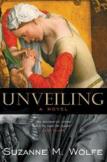Mysterious Masterpiece
Novels inspired by great works of art are hardly novel, but in the past several years their number seems to be growing. Tracy Chevalier can claim some credit for the increase, since her Girl With a Pearl Earring proved to be both a best-seller and the inspiration for a successful film, and her second novel, The Lady and the Unicorn, seems headed in the same direction.
This first novel by Suzanne Wolfe, who is executive editor of the magazine Image, clearly owes a debt to this genre, though not without Wolfe’s own special twist. Rather than novelize the making of the work of art, she has focused on its restoration, writing in the present tense about an art curator on the brink of a career-making discovery in a Roman church. What one loses thereby in fictionalized detail about the “back story” of a masterpiece, one gains in comprehension of the arduous task “and moral challenges” that face curators every day as they struggle to determine a painting’s origin and authenticity. Wolfe’s narrative style keeps the story moving along briskly, but she also gives us a feel for Rome, itself an ancient work of art as well as a bustling urban metropolis with many distinct and varied neighborhoods.
Rachel Piers is a highly successful young curator at the end of an unsuccessful marriage to an architect. We meet her as she lands in Rome to begin investigating a triptych that may be a lost masterpiece of the famous Flemish master Rogier van der Weyden. Establishing that fact would please powerful interests, especially the foundation sponsoring the restoration and her own museum in New York. As she discovers, however, such a determination would also deprive a poor Roman church’s congregation of a cherished religious icon of the Madonna.
The story of the restoration turns out, not surprisingly, to parallel a budding romance between Rachel and her Italian counterpart, Donati, an expert on pigments and a man without a first name, even in their moments of passion together. But he proves to be a stalwart supporter not only in the battle to identify and preserve the painting but also in Rachel’s traumatic miscarriage and the youthful trauma it dredges up. The family romance here includes a predatory stepfather and a distant, controlling mother who is more concerned about her own career than her daughter’s psychological welfare.
By the end of the novel Rachel has resolved at least some of her anger toward her mother, with Donati’s help, and is moving rapidly toward closure on identifying the painting. All the evidence points toward Rogier, despite a few niggling anomalies that neither she nor Donati can fully explain. At the same time, pressure is building from the funders to announce their conclusion, with the clear expectation that it will turn out to be a lost masterpiece.
Without spoiling the ending, let me assure the reader that Wolfe has a surprise or two to bring the story to a close, surprises well prepared for early in the story but still satisfying in the way they dramatically wrap up this tale of moral as well as aesthetic truth-telling. For Rachel, art restoration involves much more than good technique, and the restorer must ultimately satisfy ethical criteria as well. To enjoy the novel fully, resist the temptation to read ahead!
This article also appeared in print, under the headline “Mysterious Masterpiece,” in the October 4, 2004, issue.








